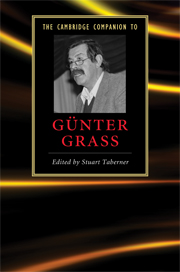Book contents
- Frontmatter
- Introduction
- 1 Biography as politics
- 2 Günter Grass’s political rhetoric
- 3 The exploratory fictions of Günter Grass
- 4 Günter Grass and magical realism
- 5 Günter Grass’s ‘Danzig Quintet’
- 6 Günter Grass and gender
- 7 Authorial construction in From the Diary of a Snail and The Meeting at Telgte
- 8 Günter Grass’s apocalyptic visions
- 9 Günter Grass and German unification
- 10 Günter Grass’s Peeling the Onion
- 11 Günter Grass as poet
- 12 Günter Grass and art
- 13 Günter Grass as dramatist
- 14 Film adaptations of Günter Grass’s prose work
- 15 Günter Grass and his contemporaries in East and West
- Guide to further reading
- Index
3 - The exploratory fictions of Günter Grass
Published online by Cambridge University Press: 28 January 2010
- Frontmatter
- Introduction
- 1 Biography as politics
- 2 Günter Grass’s political rhetoric
- 3 The exploratory fictions of Günter Grass
- 4 Günter Grass and magical realism
- 5 Günter Grass’s ‘Danzig Quintet’
- 6 Günter Grass and gender
- 7 Authorial construction in From the Diary of a Snail and The Meeting at Telgte
- 8 Günter Grass’s apocalyptic visions
- 9 Günter Grass and German unification
- 10 Günter Grass’s Peeling the Onion
- 11 Günter Grass as poet
- 12 Günter Grass and art
- 13 Günter Grass as dramatist
- 14 Film adaptations of Günter Grass’s prose work
- 15 Günter Grass and his contemporaries in East and West
- Guide to further reading
- Index
Summary
One of the most striking characteristics of Günter Grass's fictional universe is the remarkable complexity and inventiveness of the narrative strategies deployed throughout half a century of literary composition. His first poems and plays enjoyed modest success; his first novel, however, The Tin Drum, caused an immediate sensation on the German literary scene in 1959, rapidly going on to conquer the English-speaking world also. Within the next four years Grass produced two further narratives, Cat and Mouse and Dog Years, that caused almost as much furore both in Germany and abroad. All three, soon dubbed the 'Danzig Trilogy', were instant bestsellers both in German and in translation; all three were immediately greeted as literary masterpieces and works of comic genius by some readers; and all three were violently condemned by other readers (and non-readers) on grounds ranging from blasphemy and obscenity to treason. Over the succeeding decades, Grass's steady stream of highly imaginative and flauntedly idiosyncratic narratives has continued to evoke a similarly polarised reaction from his German readers. His works have regularly sold by the hundreds of thousands, regularly aroused the keen admiration of readers primarily interested in literary discourse and its possibilities, and have equally regularly been condemned, frequently with amazing venom, by readers no longer appalled on religious or moral grounds but all the more bitterly offended on the grounds of Grass's outspoken political and historical opinions.
- Type
- Chapter
- Information
- The Cambridge Companion to Günter Grass , pp. 39 - 51Publisher: Cambridge University PressPrint publication year: 2009



